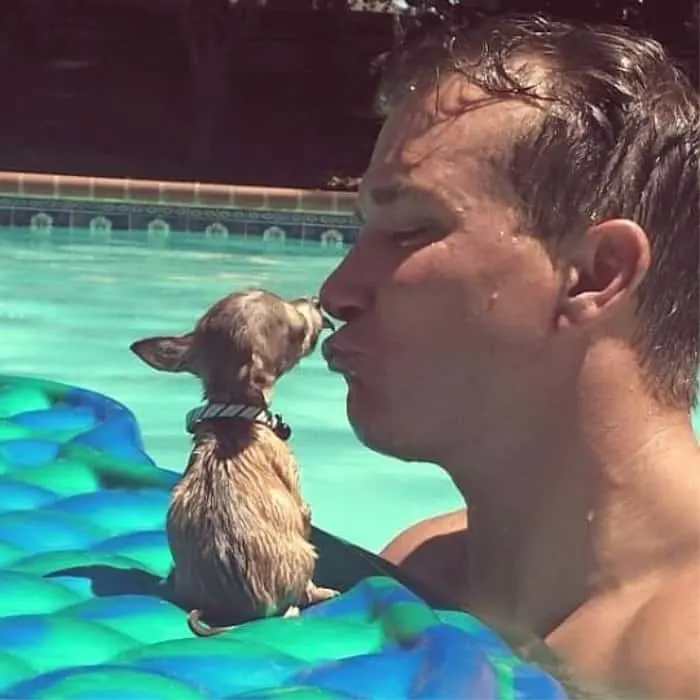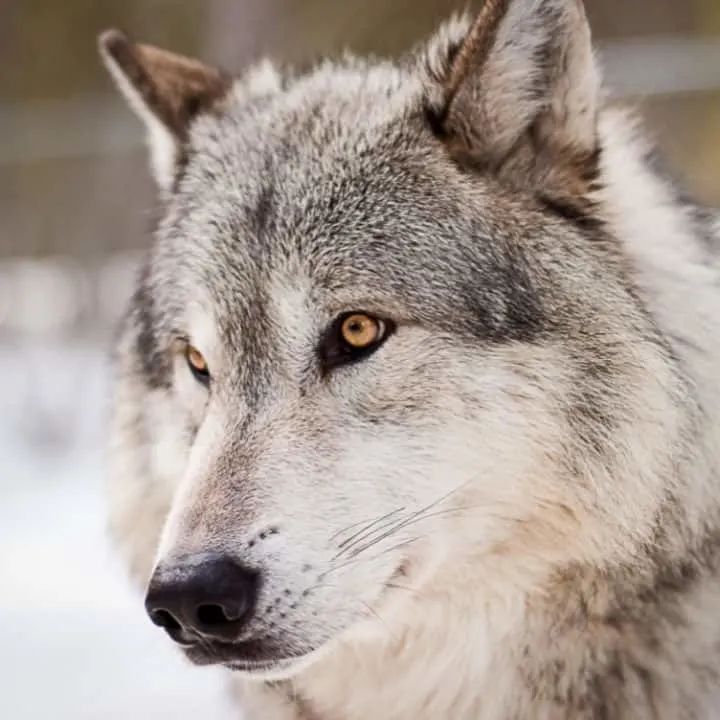Most dog owners have an intense love for their dogs, similarly to how one loves their human children. As you snuggle your dog and see their warm brown or cool blue eyes staring up at you, you might feel like he or she loves you too.
But how can you know if your dog loves you or if you are simply anthropomorphizing your dog? This article will help you be able to understand if your dog loves you and the psychology behind their love.

True Love Or Anthropomorphism?
To “anthropomorphize” means to “to attribute human form or personality to things that are not human” according to the Merriam-Webster Dictionary. Pet parents tend to do this often, which makes for entertaining memes and videos. But when it comes to believing that our dogs love us too, can they? Or is it anthropomorphism?
Most dog owners would say true love, and they will be excited to have this belief validated. Psychological research has shown that dogs can love! However, they do not feel emotions considered more complex such as shame, invalidating many humorous memes. To learn more, continue reading.
The Support Psychological Research Shows For Dogs Loving Humans
According to Dr. Stanley Coren for Psychology Today, dogs have the emotions of a two year old human. Two year old humans, and therefore dogs, are capable of experiencing love, joy, fear, anger and disgust.
How Much Do Dogs Love Their Humans?
Some dogs may love their humans more than other dogs. According to Dr. Stanley Coren for Psychology Today, an experiment was conducted with a group of dogs who lived together in a kennel environment since they were puppies, cared for by one care taker, to test if they were more attached to each other or their human care taker.
When in an unfamiliar situation and seeking comfort, these puppies chose their human care taker over their litter mates! This means we may expect a dog living in a home environment to seek out their human for comfort even more!
Dogs have also shown that they remember loved ones who have passed away, but they cannot comprehend death, discussed further by Dr. Stanley Coren for Psychology Today here.
How Do Dogs Show Love Or Affection For Their Humans?

If a dog loves a human, they are affectionate and show attachment to their preferred human. Dogs display love, affection or attachment by:
- Seeking attention; making eye contact, sitting beside a human, nudging a human for attention, etc.
- Seeking reassurance from their preferred human in an unfamiliar or stressful situation.
- If a dog is completely comfortable with a human, he or she will feel comfortable rolling onto their back. So if your dog rolls over for belly rubs, that is a sign of their attachment to you.
- “Checking in” with their human on a walk by walking beside them, looking up at them or nudging their hand.
- Choosing to be near their preferred human. Some dogs are affectionately referred to as “velcro dogs” or their human’s “shadow” when they follow their human literally everywhere they go, bathroom included!
How Can Humans Show Their Dogs They Love Them?
Establishing a strong bond with your dog is the best way to show him or her that they are loved. One on one time is crucial for establishing this bond between a human and their dog. Here are some ways to spend quality one on one time with your dog:
- Provide your dog with basic care; offering food and water, grooming, veterinary care, providing exercise, playtime, shelter and safety. This helps your dog associate you with safety, care and comfort.
- When your dog is experiencing something scary, like being at the vet, stay with him or her to offer comfort and support. This shows your dog that he or she can rely on you.
- Find ways to include your dog in as much of your life as you can; eat at restaurants with dog friendly patios, shop at dog friendly stores, take vacations with your dog, bring your dog to work, etc. There is no substitution for actually being together; the more time spent together, the stronger the bond will be.
- Work on training, either basic obedience, advanced obedience or tricks. Not only does training help your dog become better behaved thereby improving the experience of living with your dog, but training provides the pack structure to dogs that they need to flourish and bond. Dogs do best when they have a pack leader to follow. Determine if you are a pack leader with the guidance of famous trainer Cesar Milan here.
- Participate in a canine sport such as obedience, Flyball, trick dog, agility, barn hunt, etc. Working with your dog to learn a sport and to compete offers an opportunity to work as a team and strengthen your connection.
- According to Dr. Margit Gabriele Muller for Dogington Post, a great way to bond with a dog is to go on a daily walk.
- According to Casper, allowing your dog to sleep in your bed strengthens your bond with your dog because sleeping in the same bed tells him or her that they are part of your pack. Further, some owners believe that they observed improvement when training their dogs when their dogs slept in their beds.
Can We Learn More About Canine Love From Wolves?

Large adult male wolf posing for portrait
When wanting to learn more about our domestic dogs, known as “Canis familiaris“, humans have a tendency to look at the wolves they descended from, “Canis lupus”. While gray wolves are the wild descendant of our domestic dogs, they are quite different not only in appearance but also behaviorally according to PBS.
Science.org describes an experiment wherein dogs and their humans, and wolves and their humans, used eye contact, petting and speaking to measure the level of oxytocin (a hormone found to be a part of the bond between mothers and infants) in their systems. This experiment primarily focused on eye contact.
The wolves and dogs in this experiment reacted quite differently. Wolves use eye contact as a threat, so their oxytocin levels did not increase. However, there was an observable increase in the oxytocin levels of dogs; they have learned that eye contact with humans is not threatening and is actually beneficial to the relationship.
This means that if we want to learn more about canine love, we must let the dogs out, not the wolves.
Conclusion
Psychological research has shown us that dogs do love humans! To show your dog that you love him or her and to strengthen the love your dog has for you, spend quality time with your dog. While dogs love their humans, this does not extend to wolves, so do not attempt taming a wolf at home.
What does your dog do that tells you she or he loves you? What do you do to show your dog love? Share in the comments below.
Related Posts to Read:
Simple Ways to Make your Dog Feel Loved
How to Help a Rescue Dog Adjust


Sue
Saturday 18th of November 2023
This is my first chi. Owned chows, English bulldogs, and French bulldogs. I am hooked with the chi. They are so loving and loyal. I found Pablo on kijiji. People were selling him when he was 2. Turns out he has a heart murmur. I take good care of him though. He is on vetmedin and furosemide twice daily. I would do anything for him. He is 9 now. Love him dearly.
Karen Frances Allen
Sunday 10th of October 2021
How do you introduce a 10 year female chi with a six week pup?
Cathy
Sunday 10th of October 2021
About half way down this post, there are instructions on how to properly introduce a new dog: https://ilovemychi.com/how-to-avoid-sibling-rivalry-between-your-dogs/
Julie Cameron
Saturday 9th of October 2021
Heidi, my chi, sleeps with me, sits on my recliner with me while I m watching TV, we are usually wrapped in a blanket together, I watch TV, she sleeps, lol. When I sit at the table to eat a meal, she also eats, (her bowls are on the floor behind my chair). She also follows me all over the house, including when I go to the bathroom.
Mary B
Friday 8th of October 2021
I thoroughly enjoyed the article on "How to tell if your dog loves you". I hope my Mia loves me as much as I love her. We are together 24/7 and enjoy our days together.
Cathy
Friday 8th of October 2021
I'm sure she does Mary!
Kathy
Friday 8th of October 2021
How to I teach her not to Bark 4 pound Chi for 7 years Help when anyone visits Kathy Kovell
Cathy
Friday 8th of October 2021
Check out this post Kathy: https://ilovemychi.com/teaching-your-dog-not-to-bark/